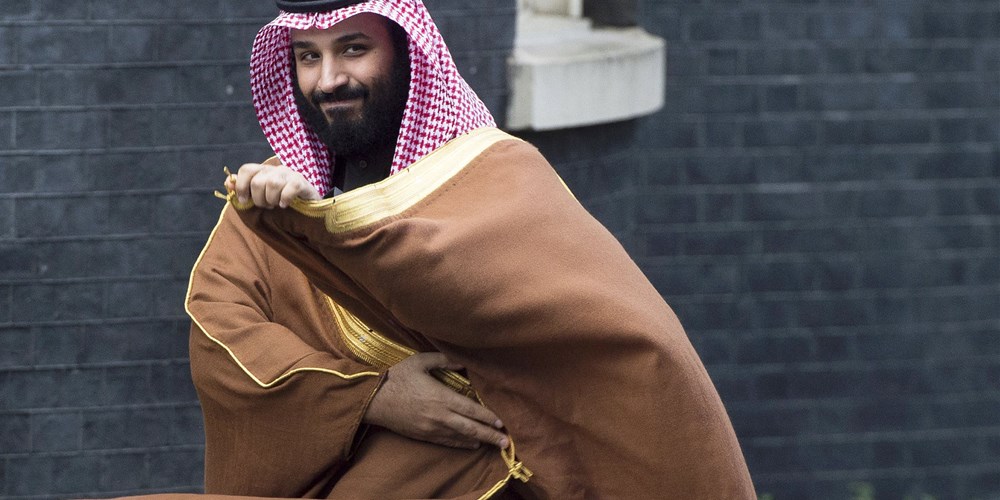
Crown Prince Mohammed bin Salman of Saudi Arabia left his homeland for a meeting in Washington D.C. Tuesday with President Trump. But the Crown Prince made some waves before he boarded the plane:
Saudi Arabia called the 2015 nuclear deal between Iran and world powers a “flawed agreement” on Monday, on the eve of a meeting between the Saudi crown prince and U.S. President Donald Trump who have both been highly critical of Iran…
…Jubeir called out Iran for what Riyadh has long slammed as Tehran’s destabilizing behavior in the region. “We’ve called for tougher policies towards Iran for years,” he said.
“We’re looking at ways in which we can push back against Iran’s nefarious activities in the region,” Jubeir said, lambasting Tehran’s support for the Houthi militia in Yemen and support for Syrian President Bashar al-Assad in Syria.
(For the record, Iran denies any “interference in the region’s affairs.”) (winkwinknudgenudgesaynomoresaynomore)

It’s the first visit to the United States for the prince since he became the heir apparent, and a sign of strengthening ties between the two countries. The Saudis were deeply suspicious of the Obama administration’s detachment from long-standing regional allies and attachment to a deal with Iran at what seemed to be any cost. In Donald Trump, they have found a fellow with a similar jaundiced view of Iran’s intentions and the United States’ obligations to honor questionable bargains.
His visit comes less than a month before President Trump has to recertify that very same agreement, and the Saudis – while denying the visit timing is anything other than coincidental – are laying down their markers:
Saudi Arabia’s hawkish young crown prince has made it clear that his patience is wearing thin. He has accused Iran of waging proxy wars across the Arab world, through Shiite groups in Yemen, Syria, Lebanon and Bahrain. In an interview with CBS’ “60 Minutes,” he repeated his assertion that Ayatollah Khamenei is the Middle East’s “Hitler” and must be stopped before it’s too late.
“Saudi Arabia does not want to acquire any nuclear bomb,” bin Salman said in the interview, which aired Sunday. “But without a doubt, if Iran developed a nuclear bomb, we will follow suit as soon as possible.”

Crown Prince Mohammed has been making the case that his country is on its way to reforming its ghastly hardline Islamic image. He hopes to both encourage investment and tourism, as well as offer disaffected youth in the country alternatives to extremism.
After Washington, Wall Street and the United Nations, Prince Mohammed will head on March 30 to the West Coast, home of America’s new economy.
He will visit arms exporter Lockheed Martin, as his predecessors might have done, but in trips to Los Angeles, San Francisco and Seattle, he will see tech giants Google, Apple and Amazon.
Saudi Arabia is still the world’s number one oil exporter, and the crown prince will indeed visit US oil hub Houston on the last leg of his trip on April 7, but he also wants to diversify.
This part of his agenda to transform an economy that has left many young Saudis of the prince’s generation idle and restless, prey to extremists, has been accompanied by an anti-corruption drive.
Reforms have been flying at a fast and furious pace with this prince at the helm, to the point where one has to worry for his safety.
Bin Salman has already instituted a series of surprising reforms to make the Muslim country — known for its bearded religious police enforcing strict social codes — more open and accepting of Western norms.
Last fall, the Kingdom agreed for the first time to allow women to drive. After 35 years, movie theaters will open again (they were shut in the 1980s during a wave of ultra-conservatism). In a break with the rigid guardianship that’s defined the kingdom for decades, it was recently announced that women can launch their own businesses without consent from a husband or male relative. And a prohibition on women attending sporting events in national stadiums was lifted.
Especially considering the EARTH-SHATTERING announcement (from a fundamentalist Islamic aspect) he made last night:
During an interview on CBS’s “60 Minutes,” the crown prince, who has curtailed the ability of religious police to arrest women for dress code violations, said women are equal to men: “We are all human beings and there is no difference.”
According to some reports, certain senior officials are concerned the prince is, himself, a destabilizing factor, with his rapid-fire reforms, posture in a family feud and hard line responses to Iranian ambition. European allies weighed in on the side of the Iran deal, warning the withdrawal may encourage Iran to “go its own way.” But a case can be pretty persuasively made that Iran already was doing exactly that. Letting Rex Tillerson go is also moaned over by the usual suspects, thanks to his support of the deal, and now, without his input, one less “rational” voice. (Sound like Corker, anyone?)
European allies have warned Trump that pulling out of the Iran nuclear deal may only embolden the Islamic Republic to go its own way, but officials closest to Trump remain skeptical that he will recertify the deal come May 12.
“I think the president likely will move away from it, unless our European counterparts really come together on a framework,” Sen. Bob Corker, R-Tenn., head of the Senate Foreign Relations Committee, told CBS’s “Face the Nation” on Sunday. “And it doesn’t feel to me that they are.”
Oh, yes, yes. Let’s all sweat the Europeans. Shocking they couldn’t come up with an alternate plan to offer, right? Give it a rest with the Europeans, why don’t you?
A line from The Princess Bride comes to mind: “We are men of action. Lies do not become us.” I think tomorrow will see two men of action meeting where there has been little but lies going forth before.
Leave a Reply